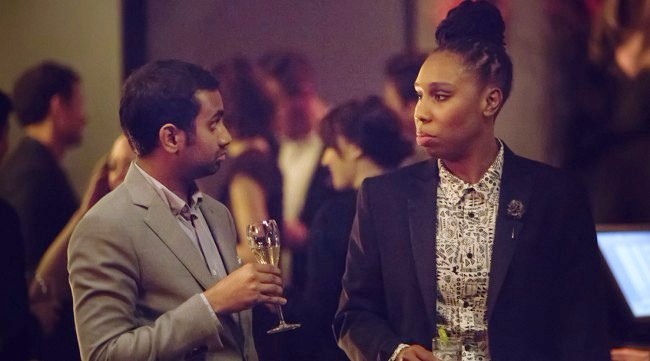
The weeks following the accusations of sexual assault against Aziz Ansari have led to a possibly unforeseen, new wrinkles in the nuances of the #MeToo movement and the Time’s Up anti-harassment initiative. Women champions of the movement have lent their thoughts on the incident, with some defending Ansari, saying it was a “bad date,” to others calling for the end of the comedian’s career.
Speaking on radio station KPCC’s The Frame, Ansari’s Master of None co-star Lena Waithe lent her take on the situation and echoed what the likes of Amy Schumer and CNN’s Ashleigh Banfield (who called the incident a “bad date”) have said about the complicated situation: “You have to take each situation [individually]. You can’t just say, ‘Well, I’m on this person’s team’ or ‘I’m on that person’s team.’ It doesn’t work that way,” she said.
Waithe went on to say that the line that is crossed is not well-defined yet and that a strict set of allegiances in the timely cultural movement shouldn’t be blindly adhered to: “I’m not on Harvey Weinstein’s side, I’m not on Kevin Spacey’s side,” she explained.
And Waithe isn’t interested in presenting a problem with what has happened without some semblance of a solution. She suggests creating a code of conduct, saying “Those are things that we need” because “how do you know what appropriate behavior is if no one’s ever communicated to you what appropriate behavior is? Even though some people may assume, ‘Well, of course, we all know what appropriate behavior is,’ but some people may not know.”
“But it’s about really sitting with yourself and educating yourself in terms of what consent is, what it looks like, what it feels like, what it sounds like. And all of us starting to really act accordingly based on this new information that I think we have now. We all gotta start talking to each other, start educating each other.”
The writer and actress has been involved with Time’s Up and has furthered the exposure of the #MeToo movement. Now, with the accusations around Ansari, she’s not only defending a friend and co-worker but recognizing that a necessary dialogue needs to happen if an effective change will take hold.
“I think a big thing is, we have to have a dialogue. And I think if we’re unwilling to have a dialogue we’re gonna continue to keep hitting our heads against the wall.”
(Via 89.3 KPCC / The Hollywood Reporter)
